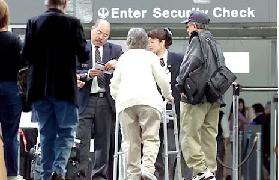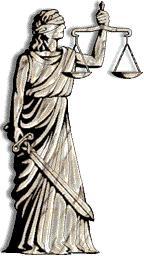In search of the causes of the proposal of legal auditing and of the affection I feel for young lawyers
Jayme Vita Roso*
– I –
 With the sun at its zenith, on a cloudless day on the morning of December 3rd 2006, a Sunday, I set myself the task of meeting, at Guarulhos Airport, three brothers who were journeying from Recife. Two were lawyers, Alexandre and André, and the third, Anselmo Júnior, was an undergraduate law student, having first completed a degree in business administration. All three were past, or present, students of the same educational institution, namely Pontifícia Universidade Católica (PUC) in the State of Pernambuco.
With the sun at its zenith, on a cloudless day on the morning of December 3rd 2006, a Sunday, I set myself the task of meeting, at Guarulhos Airport, three brothers who were journeying from Recife. Two were lawyers, Alexandre and André, and the third, Anselmo Júnior, was an undergraduate law student, having first completed a degree in business administration. All three were past, or present, students of the same educational institution, namely Pontifícia Universidade Católica (PUC) in the State of Pernambuco.
They were all young, not having yet reached the age of thirty, although the women of the time of Honoré de Balzac[1] (XIX century) would have considered them experienced. And this French writer managed, with his cyclopic work The Human Comedy[2], to give a pictorial exposition of French society as no other writer had ever dared sketch, with a wealth of detail on customs, habits, behavior, beliefs and activities of every kind.
Reflecting upon chronological age as the cause of experience and, consequently, as the molder of values of standards and as the inciter of paradigms for private and professional life, was how we started the valuable and profitable conversation we were to have on our way from the airport to the hotel, where they intended to stay for three days and which was located on Paulista Avenue very close to São Luís Church.
On the way, we discussed the precariousness of São Paulo’s means of communication, which, for so many years, have been neglected as the object of cogitation by the authorities, blind to the abusive growth of cars in the city but concerned exclusively with the results at the ballot. This dialogue ended up covering, among other current themes only possible between lawyers engaged[3] in their professions, not only their professional milieu but also the society in which they are inserted.
Thunderous[4] was our unanimous criticism. Due to the very facts discussed, such criticism would be considered nescient, since it is common in the intellectual circles of political correctness to always label it thus, with pejorative rancor.
 Parking the car at the elected hotel, they spied São Luís church and asked me what a university of economics – which, surprisingly, was Jesuitical in orientation - was doing located in such a place. I briefly recounted to them the intimate and healthy connection that this religious order had with the workers’ and social movements of the previous century in São Paulo. After the fall of the Vargas dictatorship (1945), this religious order sought to steer the workers’ movements in accordance with Pope Leo XIII’s ideas and proposals as set forth in the Rerum Novarum[5] encyclical.
Parking the car at the elected hotel, they spied São Luís church and asked me what a university of economics – which, surprisingly, was Jesuitical in orientation - was doing located in such a place. I briefly recounted to them the intimate and healthy connection that this religious order had with the workers’ and social movements of the previous century in São Paulo. After the fall of the Vargas dictatorship (1945), this religious order sought to steer the workers’ movements in accordance with Pope Leo XIII’s ideas and proposals as set forth in the Rerum Novarum[5] encyclical.
And, thanks to a pugnacious Jesuit who had rare culture and the perception for what a more promising future for the country might be with able engineers, father Sabóia de Medeiros was the idealizer and institutionalizer of the University of Industrial Engineering (FEI).
Satisfied with these brief explanations, we arranged to have lunch at noon on December 4th, at Café Martinelli, an establishment located on Líbero Badaró Street within the respected old building named after the Martinelli family.
We complimented each other on our punctuality, which is a rare thing given the chaos that is São Paulo. We chose two tables of small dimensions in order to enjoy, in that little spot, nothing other than the sweet chords of the ambient music. After all, we deserved tranquility because this generation had forgotten - or perhaps had never learned - how productive and healthy silence can be. They are afraid of silence because they are afraid to face up to their own selves. This is disturbing at first sight, but, if managed with propriety, is the antidote to depression, a condition fabricated in order to sell medicine aimed at affluent society.
– II –
The three brothers came prepared to put me in the crossfire, and directed at me intriguing questions that went straight to the mark. As these questions were articulated with the clarifying objective of giving me reason to invade land I had hitherto untrod upon in previous writings on legal auditing, I took those traditional breaths that lead to tranquility and reflection that I had learned years ago from my friend Cao Ming in my gi-gong lessons.
In general terms, they wanted to know if the legal auditing that I had systematically launched in June 2001, bound in the book Auditoria Jurídica para a Sociedade Democrática[6] (Legal Auditing for Democratic Society) was my creation. Initially, I responded, the title was Environmental Legal Auditing (Auditoria Jurídica Ambiental), which was then changed to Legal Auditing for Society (Auditoria Juridídica para a Sociedade), and the book was definitively completed by the most excellent of professors, Willis Santiago Guerra Filho, from the State of Ceará.
They then asked me whether this legal auditing was the product of an experience that I wanted to bequeath, and enquired, further, why it was directed at young lawyers. They wanted to know why I insisted on addressing to young lawyers so many multifaceted texts without any apparent unity?
As the intention of these lines is to systematize and order my thoughts so that they may have a practical purpose and open concentric circles within this line of enquiry, I will seek to give you scientific exactitude and, for such, will obey the sequential order of the questions and repeat each one.
a. Is legal auditing my creation?
I am not the creator of the name or the discipline. While researching and reading up on the subject, I came across the minutest of essays written by an Argentine lawyer, Héctor P. O. Charry[7], inciter of thought and capable, even, of perturbing because, although he does little to educate, he informs and instigates.
Could it be that auditing connected to the legal area had never existed?
My question was answered when I came upon, in Canon Law, the existence of the legal auditor in the role of auxiliary judge[8].
It had never occurred to me to find out why, at the time of the Coup of 1964, the Military Justice had auditors, and I refuse, out of intellectual probity, to accept the ‘judgments’ handed down by such Military Justice during the time when the National Security Law had not yet been extinguished and the country had not yet returned to democratic normality. It does not behove any lawyer who is conscious of his duty to preserve and defend democracy to bow, for material or any other interests, to any breach in republican legality.
 Later on, after having read the valuable work The Audit Society: Rituals of Verification, by Michael Power[9], I was to widen my horizons on auditing, although Mr. Power did not consider - perhaps because he is an economist unattached to legal science, or because he was educated in the spirit of common law - that the roll of the jurist is circumscribed to other models or obeys paradigms that are different from continental law[10].
Later on, after having read the valuable work The Audit Society: Rituals of Verification, by Michael Power[9], I was to widen my horizons on auditing, although Mr. Power did not consider - perhaps because he is an economist unattached to legal science, or because he was educated in the spirit of common law - that the roll of the jurist is circumscribed to other models or obeys paradigms that are different from continental law[10].
And, furthermore, a few months ago, I found a book written by Australian jurists, the theme of which was: Audit in a Democracy: The Australian Model of PublicSector Audit and its Application to Emerging Markets[11]. Auditing democracy is pertinent to lawyers and, consequently, to legal auditors with solid culture.
Reason leaps into view: if a lawyer, in order to defend democracy, exceeds the well-worn and mystifying rule of law, which, today, accommodates illegal arrests, defenseless judgments, the farce of invading countries with merely personal or business-orientated pretexts, or physical, psychological or moral torture, then that lawyer is an accomplice to these acts against humanitarian rights and, in this capacity, goes on to justify his behavior to the detriment of supranational norms, as was the case in the Soviet Union, or in the Third Reich or in Mao Tse Tung’s China.
I went into detail in order to confirm that, in legal auditing, the executor must be a lawyer who is committed to authentic democratic regime, devoid of adornment and artificial coloring. After all, it is only in concrete cases of war, revolution or other hypotheses – all of which are exceptional – that there is the suspension of individual guarantees (section 84, XIV, and 91, § 1, II of the Brazilian Federal Constitution) never the suppression thereof.
Eschewing cover-ups or masks, it is up to lawyers to assume a vanguardian position for the preservation and the defense of democracy in its entirety. Even when their addressees or public are uncertain, within a boundary-free auditorium, as in the case of the anarchic internet, ideas on democratic values should spring from the conscience, free and unimpeded.
This is the capital reason for legal auditing, with the amplitude I gave you when I defined it.
b. As in a dialogue, or yechivah13, to the question of whether the scientific structuring that is in the process of being made “is the product of an experience that I wish to bequeath and why I direct it to young lawyers”, I respond that I will deal with this question with care, employing the classical method of contradiction as argument.
Before beginning, I would like to say that, when the word experience arises in the traditional sense, which is being used as the consumable product of tests reproduced over a lifetime, with successes and failures, or with both successes and failures in equal or different measure, in successive or interrupted ages, I revert to an essay written by Walter Benjamin, who was no more than twenty five at the time, that shocks us by saying: “The mask of the adult is called ‘experience’. It is inexpressive, impenetrable, unchanging. This adult has seen it all: youth, ideas, hope, women. It was all an illusion”[12].
As an experienced adult, I feel no need to disclose what I have experienced much less prove anything to anyone.
And, in the Benjaminian way of always questioning with sobriety, the short night of our youth does not serve as an absence of commitment, impoverished of ideas, but rather, serves as a means of encouragement to realize something new and great in the future. As experience possesses content, avoiding error is the sign that one is reflecting. Experience has meaning because “it may be that experience is painful for the person who aspires to it, but rarely will it lead him to despair”[13], and finally: “young people will experience the spirit and, the more difficult the conquest of grandiose things is, the more they will find the spirit everywhere in their journey and in all men”[14].
I do not seek a Proustian alternative. I arduously desire that everyone find themselves within their elected profession so that a healthy encounter with personal happiness may be had, guaranteeing them the fullness of youth and a life lived pleasurably. And I desire, further, that they do so without remorse, without struggling with themselves, without hating the passenger. And, to close, I reproduce the text by Friedrich Schiller (1759-1850, from the drama Don Carlos), which Benjamin chose:
Tell him
That through the dreams of his youth
He should have consideration, when he is a man[15].
c. The last question - why do I insist on addressing to young lawyers so many multifaceted texts without any apparent unity? - seems to have been covered. I add to it.
When one chooses an audience, when one has the privilege of having the option of directing ideas and of propagating them, one is morally obliged to do so. Making that choice is an act of extreme personal option. This done, all that remains for he who wanted such a choice is to try to give it his personal touch, also. But, it does not arise from futile or superfluous sensations: it comes from the bottom of the heart, and nowhere else. It is for this reason that I remember the ragioniere (story teller) of fond memory, Mario Rossetto, when, in Padova he whispered to me: In questo lavoro, amico mio, manca passione, nonostante sia tecnico[16].
It is with extreme passion for the practice of law and for young lawyers, its heralds, that I incite young lawyers to be men of conscience and knowledge, for only thus may they rise up and have a solid base on which to face, without faltering, the obstacles that life imposes.
I paid the bill that the lawyer Carla Vigorito - today restauratrice - presented me with, happy as can be, and knowing that I had also made happy the young lawyers and their brother, who return to Recife tomorrow.
[1] Honoré de Balzac (1799-1850), French novelist.
[2] This work is compiled of over ninety novels and short stories.In it, Balzac seeks to portrait the reality of the French bourgeois life of that time.From this author arose the word balzacian, which, as a noun, means specialist or amateur of the work of Balzac, and as an adjective means relative to Balzac or to his work; that which is similar to a character of Balzac.Finally, also, there is the rare noun balzacism, or the literary doctrine that inspires itself on Balzac’s work.Balzacien, enne. Balzacisme. In:Dictionnaire Culturel en Langue Française.Paris:Dictionnaires Le Robert, 2005. p. 747.
[3] GUIGOT, André.L’engagement des intellectuels au XXe siècle.Toulouse:Éditions Milan, 2003. 63 p.
[4] Tonitruante is the word used in the original Portuguese text. It means “that which thunders, which speaks and sings resoundingly”.In:CALDAS AULETE.Dicionário Contemporâneo da Língua Portuguesa (Contemporary Dictionary of the Portuguese Language).Rio de Janeiro:Editora Delta, 1964.p.3.994.
[5] Encyclical Letter Rerum Novarum, which deals with the condition of workers, passed in Rome on 15th May 1891, by Pope Leo XIII.
[6] ROSO, Jayme Vita. “Auditoria Jurídica para a Sociedade Democrática” (“Legal Auditing for Democratic Society”).São Paulo:Escolas Profissionais Salesianas, 2001. 192 p.
[7] Auditoría jurídica (Legal Auditing).Buenos Aires:Abeledo Perrot S.A.E., 1997. 100 p.
[8] ROSO, Jayme Vita.Auditoria jurídica para a sociedade democrática (Legal Auditing for a Democratic Society).São Paulo:Escolas Profissionais Salesianas, 2001. 57 p.
[9] POWER, Michael. The audit society: Rituals of verification. Oxford: Oxford University Press, 1999. 183 p.
[10] ROSO, Jayme Vita. Direito em Migalhas: Pistas para o novo mundo jurídico. Campinas: Millennium Editora, 2006. 450 p.
[11] NICOLL, Paul.Audit in a Democracy.The Australian Model of Public Sector Audit and its Application to Emerging Markets.Burlington:Ashgate Publishing Company, 2005. 233 p.
[12] BENJAMIN, Walter.Reflexões sobre a criança, o brinquedo e a educação (Reflexions on Children, Toys and Education)São Paulo:Editora 34 – Livraria Duas Cidades, 2002. p. 21.
[16]Translation: “In this work, my friend, there lacks passion (ardor), albeit technical”.